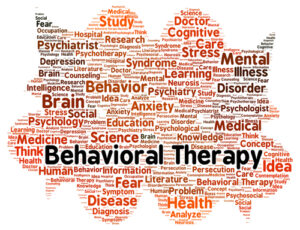Mental illness is a problem that affects many people all over the world. In the past, treatment options were limited, but now there is a new way to treat mental illnesses. ERP therapy, or exposure and response prevention therapy, is a type of cognitive-behavioral therapy that is very effective in treating mental illnesses. In this blog post, we will discuss what ERP therapy is and how it can help you or your loved one overcome mental illness.
Contents
What Is ERP Therapy?

Exposure and Response Prevention Therapy is a type of cognitive-behavioral therapy that is based on the principle of exposure and response prevention. Exposure therapy is a type of treatment in which people are exposed to the things that trigger their anxiety or fear, in a safe and controlled environment. Response prevention is when people are taught how to control their reactions to the things they are afraid of.
Who Does It Help?
ERP therapy is an effective treatment for various mental disorders. These include:
- OCD
- PTSD
- Phobias
- Social anxiety
Some common compulsions which are treated during the procedure include:
- Intrusive, often self-harming thoughts which disrupt daily life routine
- Excessive focus on moral or religious ethics
- Extreme paranoia about losing control
- Constant fear of contaminating germs or other external pathogens
- Compulsive, often repetitive patterns of behaviors that reduce the quality of life
How Does It Work?
The ‘E’ in ERP stands for Exposure. This process involves exposing yourself to images/people/situations which trigger you.
The ‘RP’ stands for Response Prevention. Herein, your therapist will further help you in managing the intensity of your reaction to these triggers.
For example, someone with a fear of heights may believe that they are in danger of falling off the edge of a building if they go outside on a balcony. By exposure to heights in a safe environment, and with the help of a therapist, they can begin to challenge this belief and eventually overcome their fear.
This is helpful for people with prominent phobias, intrusive thoughts, repetitive compulsions, and other irrational fears.
Techniques Used In ERP

Your therapist will work with you to come up with a plan that is tailored to your specific needs. The techniques used in ERP will depend on the type of mental illness you have, as well as your triggers.
Some common techniques used in ERP therapy include:
- Systematic Desensitization: This involves gradually exposing yourself to the things that trigger your anxiety or fear, starting with the least feared item and working up to the most feared item.
- Imaginal Exposure: This involves exposure to the things that trigger your anxiety or fear through imagination. For example, if you have a fear of flying, your therapist may have you imagine flying on an airplane while they provide support and guidance.
- Flooding: Herein, the client faces complete exposure to high anxiety-provoking stimuli without lessening the intensity. This makes the client face their deepest fears all at once. This makes for diminishing the fearful or negative response to anxiety-ridden stimuli by complete exposure.
- Habituation: This process is used to decrease anxious responses by making an individual “used to” the aversive stimuli, little by little.
Benefits Of ERP Therapy

ERP therapy has short-term pain for long-term gains. It is very effective in treating mental illnesses, such as
- anxiety disorders
- OCD
- PTSD
It also helps people to overcome their fear or anxiety in a safe and controlled environment. This means that people can learn how to control their reactions to the things they are afraid of without having to face them in real life.
Another benefit of ERP therapy is that it can be done in a group setting or individually. This means that people can also get the help they need in a way that suits them best.
Limitations Of ERP Therapy
ERP therapy is an effective treatment for mental illnesses, but it is not a permanent cure. Some commonly noted downsides of ERP therapy include:
- It can be extremely difficult and uncomfortable for some people
- Oftentimes, it worsens the symptoms, if not done properly
- It requires clients to engage in therapeutic interventions even outside the session, which can further be emotionally taxing
- This technique by itself may not be adequate to treat an individual’s symptoms. They might need further medication or other therapeutic interventions for effective treatment
Conclusion
ERP therapy is a new and effective way to treat mental illnesses. If you or someone you know is struggling with mental illness, consider seeking out ERP therapy as a treatment option. It could also make all the difference in helping you or your loved one live a happy and healthy life.
A Word From Therapy Mantra
Your mental health — Your psychological, emotional, and social well-being — has an impact on every aspect of your life. Positive mental health essentially allows you to effectively deal with life’s everyday challenges.
At TherapyMantra, we have a team of therapists who provide affordable online therapy to assist you with issues such as depression, anxiety, stress, workplace Issues, addiction, relationship, OCD, LGBTQ, and PTSD. You can book a free therapy or download our free Android or iOS app.


